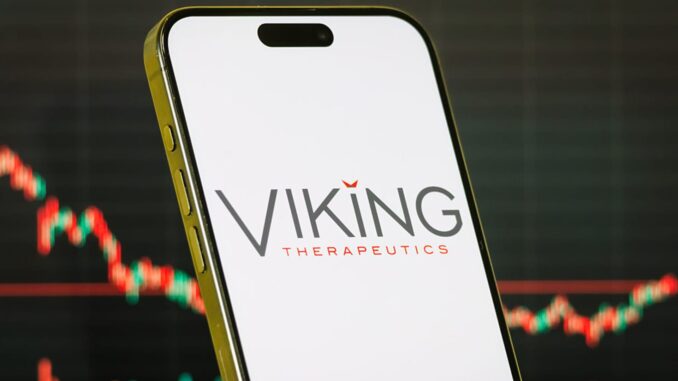
Shares of Viking Therapeutics fell 40% on Tuesday after the company released mid-stage trial data on its obesity pill that disappointed investors.
The results could be a blow to Viking, which was once seen as a hot M&A target as pharmaceutical companies scramble to join the booming market for obesity and diabetes drugs. It could reinforce Eli Lilly and Novo Nordisk‘s dominance in the space, especially as they develop pills for weight loss that could enter the market years ahead of the tablet formulation of Viking’s drug, VK2735.
Jared Holz, Mizuho health care equity strategist, said in an email Tuesday that the data “probably shutters hope for [Viking] to be a bigtime player in the oral obesity market over the near to medium term.”
The race to develop a more convenient obesity pill has been fraught, as companies such as Pfizer have had to scrap previous contenders and bring forth new ones.
Viking’s once-daily pill helped patients lose up to 12.2% of their weight at around three months. The company also said that weight loss didn’t plateau, which means patients could lose even more in a longer-term study.
It’s difficult to directly compare the pill’s phase two trial data to the results of oral drugs further along in development, including treatments developed by Eli Lilly and Novo Nordisk.
Holz added that the results on Viking’s pill “look inferior” to those of Eli Lilly’s oral drug “on almost all metrics.” The highest dose of Eli Lilly’s daily pill helped patients lose 12.4% of their body weight, or 11.2% regardless of discontinuations, at 72 weeks in a phase three trial.
Holz pointed to the high rate of patients who discontinued Viking’s drug for any reason over 13 weeks, which was around 28%. Meanwhile, around a quarter of people discontinued Eli Lilly’s pill, orforglipron, for any reason over 72 weeks.
That’s “a much longer trial and therefore [Lilly] looks far better head-to-head,” Holz said.
Viking said the most common reasons for patients to discontinue treatment were gastrointestinal side effects, the majority of which were mild to moderate in severity and observed earlier in treatment. But around 58% of patients on the pill reported experiencing nausea and 26% experienced vomiting, compared to 48% and 10%, respectively, among those who took a placebo.
Those side effect rates over a shorter trial period appear to be worse than those seen in trials on Eli Lilly’s pill and the oral version of Novo Nordisk’s weight loss drug Wegovy.
Viking’s treatment works by imitating two naturally produced gut hormones called GLP-1 and GIP.
GLP-1 helps reduce food intake and appetite. GIP, which also suppresses appetite, may also improve how the body breaks down sugar and fat.
Eli Lilly’s pill and the oral version of Novo Nordisk’s Wegovy both target GLP-1, but the latter has dietary restrictions.
Be the first to comment